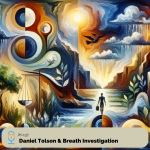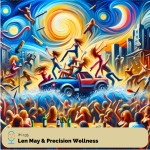
Betty Guadagno & Near Death Reinvention
Summary
In this conversation, Betty Guadagno shares her profound journey from a life of addiction and trauma to a transformative near-death experience that reshaped her understanding of life, love, and purpose. She discusses her family’s history of addiction, her own struggles, and the pivotal moment that led to her spiritual awakening. Through her life review, she gained insights into her past actions and the interconnectedness of all beings, ultimately embracing her role in the collective healing of trauma. Betty’s story is one of resilience, self-discovery, and the quest for meaning in a chaotic world. In this conversation, Betty Guadagno shares her profound journey from addiction to recovery, highlighting her spiritual awakening and the transformative experiences that shaped her understanding of life and self-worth. She discusses the challenges of her past, the insights gained from her near-death experience, and the importance of community and lived experience in the recovery process. The dialogue explores themes of consciousness, personal growth, and the significance of finding one’s purpose in life. In this conversation, Betty Guadagno shares her profound journey of transformation following a near-death experience. She discusses her initial feelings of rage and abandonment, her evolving relationship with God, and how she redefined her spirituality. Through personal anecdotes, she emphasizes the importance of community, acceptance, and the power of manifestation. Betty encourages listeners to embrace their roles as main characters in their lives and to seek joy and connection in their journeys. The conversation culminates in a discussion about the duality of existence and the importance of taking action in life.
Takeaways
- Betty’s life was marked by addiction and trauma from a young age.
- She experienced a near-death experience that transformed her perspective.
- Her life review revealed the pain she inflicted on others.
- Betty learned about the interconnectedness of all souls.
- She discovered her purpose in healing collective trauma.
- The experience of unconditional love was profound and transformative.
- Betty’s journey emphasizes the importance of personal growth and healing.
- She believes every soul on earth is here for a greater purpose.
- Her story illustrates the power of resilience and self-discovery.
- Betty’s insights challenge the traditional views of victimhood and empowerment. The first part of your life can feel like boot camp, but it prepares you for your mission.
- Spiritual experiences can be tailored to an individual’s understanding and cultural context.
- The great awakening signifies a shift from ego-centered to service-centered consciousness.
- Lived experience is a powerful tool in helping others overcome addiction.
- Finding community and support is crucial in the recovery journey.
- Transformation often requires a deep understanding of one’s worthiness.
- Addiction is a disease, not a moral failing.
- Healing can come in unexpected ways, often through spiritual experiences.
- The journey of recovery involves relearning how to live and be human.
- Awareness and focus on positive causes can shape one’s reality. I went through so much rage because I was like, why is God abandoning me?
- It’s not about going back to heaven. It’s about bringing heaven to earth.
- I have a direct line to spirit at all times. Everybody does.
- We all can be main characters in our story. That’s what an abundance mindset is all about.
- If your life doesn’t feel fun, please reach out because it’s supposed to be fun.
- Transformation is inevitable. We’re not meant to stay caterpillars.
- You can just learn from other people. Lots of people do that with lots of things.
- You can invest your energy in either fear or faith.
- The locks are undone, the door is blasted open. You can go and live your biggest, truest life.
- I can’t wait to come back. I can’t wait to do this all over again.
Chapters
00:00 Introduction and Background
02:56 Life of Addiction and Trauma
05:50 Near-Death Experience and Life Review
08:49 Transformation and Spiritual Awakening
11:58 The Cosmic Perspective and Life Choices
15:07 Understanding Trauma and Healing
18:00 The Mission of Life and Collective Healing
21:05 Returning to Earth and Embracing Purpose
22:41 The Choice of Existence
24:03 The Transition from Boot Camp to Mission
25:53 Cultural Context and Spiritual Language
27:50 The Great Awakening and Transformation of Consciousness
31:45 The Journey from Addiction to Recovery
39:03 Finding Worthiness and Community in Recovery
42:39 Journey Through Rage and Acceptance
45:03 Finding God Beyond Traditional Beliefs
47:22 Redefining Spirituality and Personal Growth
49:14 Manifestation and Personal Transformation
51:42 Becoming the Main Character of Your Life
54:46 The Game of Life: Embracing Duality
57:33 The Importance of Community and Connection
01:00:41 The Roller Coaster of Existence
01:02:53 Acceptance and the Journey of Life
01:05:45 Transformation and Helping Others
Podcast: Play in new window | Download








